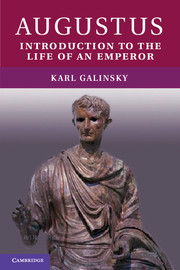Book contents
- Frontmatter
- Contents
- List of Maps, Genealogical Chart, and Illustrations
- Maps & Genealogical Chart
- Timeline
- Note on Major Ancient Sources
- Preface
- 1 From Velitrae To Caesar’s Heir
- 2 Power Struggles and Civil War
- 3 The Experiment of the Principate
- 4 The Challenge of Pax Augusta
- 5 Augustus at Home
- 6 Cultural Vitality
- 7 The Augustan Empire
- 8 The Final Days and an Assessment
- Select Bibliography and References for Further Reading
- Index
- Index of Passages and Inscriptions
8 - The Final Days and an Assessment
Published online by Cambridge University Press: 05 February 2013
- Frontmatter
- Contents
- List of Maps, Genealogical Chart, and Illustrations
- Maps & Genealogical Chart
- Timeline
- Note on Major Ancient Sources
- Preface
- 1 From Velitrae To Caesar’s Heir
- 2 Power Struggles and Civil War
- 3 The Experiment of the Principate
- 4 The Challenge of Pax Augusta
- 5 Augustus at Home
- 6 Cultural Vitality
- 7 The Augustan Empire
- 8 The Final Days and an Assessment
- Select Bibliography and References for Further Reading
- Index
- Index of Passages and Inscriptions
Summary
Death of an Emperor
“So Augustus fell sick and died,” writes Dio (56.30). Of course, no respectable biographer, ancient or modern, would be content with such a shocking display of brevity, and Dio was not either. The death of a legend, and especially a legend in his own time, called for more detail and drama. It was supplied in ample doses; most writers, for instance, reach into the usual grab bag of omens similar to those that, retrospectively, presaged his birth, and the procedure makes for nice bookends of his life. Besides, hooting owls and thunderbolts, for example, handily negotiate the space between the grossly incredible and the merely humdrum.
When we sift through the accounts especially of Suetonius, Dio, Tacitus, and Velleius, we can arrive at a reasonably accurate reconstruction that stays clear of biases such as Tacitus’ usual demonization of Livia. In August of AD 14, Augustus sent Tiberius to Illyricum, the territory of the provinces of Dalmatia and Pannonia (see Map 1), to “strengthen the peace” there. He planned to accompany him as far south as Beneventum and also wanted to take in some athletic contests in Naples. On the way, he fell sick – precisely because diarrhea is so banal, it sounds authentic – and took a break of a few days on Capri. According to Suetonius (Aug. 98), it became the occasion for tangibly promoting the mix, endemic to Roman culture, of Greek and Roman: “He distributed togas to the Greeks and Greek cloaks (pallia) to the Romans; insisting that the Romans should speak Greek and dress like Greeks, and that the Greeks should do the opposite.” Ever the jovial host that we know from the Palatine, he presided over a lively dinner party where the young guests had a great time and Augustus gleefully took part in the general merriment (p. 139). He also joked about some events on the island and teased Tiberius’ astrologer. No gloomy premonitions here.
- Type
- Chapter
- Information
- AugustusIntroduction to the Life of an Emperor, pp. 176 - 186Publisher: Cambridge University PressPrint publication year: 2012



